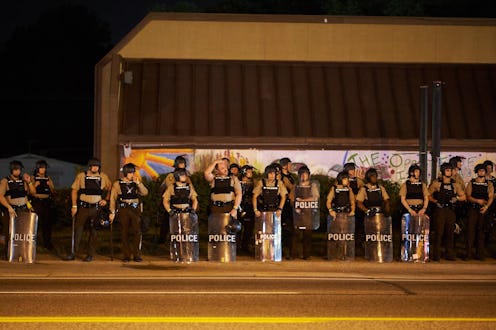News
Trump Is Undoing Obama's Post-Ferguson Ban On Giving Military Gear To Local Cops — REPORT

In yet another reversal of a policy that President Obama put in place, documents have emerged revealing the White House's plan for another controversial executive order. President Trump will send surplus military gear to police departments across the country, thanks to an order he will sign that nullifies an Obama-era ban on the practice, USA Today reports.
Transfers of extra military equipment to police departments across the country began in the 1990s, when it was considered a necessary bolster for those local, state, and federal departments in the war on drugs. This equipment, all military grade, ranges from armored cars to bayonets to grenade launchers. These transfers came to Obama's attention in 2014 in the aftermath of the Ferguson riots, in which protestors gathered after a white policeman shot and killed Michael Brown, an unarmed black man.
Many observers, Obama included, found the police's response in Ferguson to be overly militarized and thought that it contributed to the mistrust between the black community and the police. “We’ve seen how militarized gear can sometimes give people a feeling like they’re an occupying force,” Obama said, when he announced his decision to ban transfers of equipment from the military to police forces across the country.
Now, USA Today has obtained documents revealing that Trump plans to walk back that ban and allow the military to transfer its extra equipment to local, state, and federal police departments again. The administration's justification for the executive order that Trump will sign ending Obama's ban includes arguments that the police need this sort of equipment to keep the country safe and that the equipment would otherwise go to waste. "Assets that would otherwise be scrapped can be re-purposed to help state, local and tribal law enforcement better protect public safety and reduce crime," the documents said.
It also focuses on the belief that the police need this sort of equipment to keep themselves safe, saying that "much of the equipment provided through the 1033 program is entirely defensive in nature ... that protect officers in active shooter scenarios and other dangerous situations."
This starkly highlights the differences between the Trump and the Obama administration's respective perspectives on the issue. Obama, who aimed to heal the breach between communities of color and law enforcement, put the ban in place partly because military grade equipment could all too easily "alienate and intimidate local residents and may send the wrong message." Trump, however, has generally sided with law enforcement and not made any attempt to fix the racial divide in the country.
If the White House does indeed announce it this week, it will come at an especially tense time regarding Trump's relationship with the law enforcement community. They only announced on Friday that Trump would pardon Sheriff Joe Arpaio, a former sheriff who was facing jail time after disregarding orders to stop racially profiling people who he thought could have been illegal immigrants. The president's sympathies, it would seem, lie entirely with those potentially wielding the military grade weaponry and not with those who might feel threatened by them.